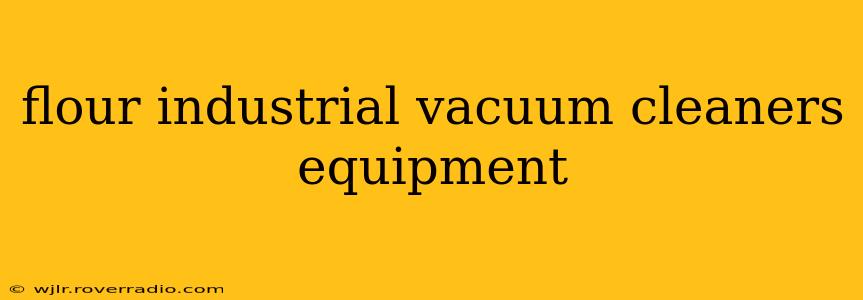Flour dust presents a significant challenge in industrial settings. Not only is it a nuisance, creating messy work environments, but it also poses a serious fire and explosion hazard. Therefore, selecting and using the right industrial vacuum cleaner is crucial for safety and efficient operation in flour mills, bakeries, and food processing plants. This guide explores the essential aspects of choosing the best flour industrial vacuum cleaner equipment for your needs.
What are the Best Vacuum Cleaners for Flour?
The best vacuum cleaner for flour applications needs to meet specific requirements that go beyond those of a standard industrial vacuum. Key characteristics include:
-
High-efficiency filtration: Flour dust is fine and easily airborne, necessitating a HEPA (High-Efficiency Particulate Air) filtration system capable of capturing particles down to 0.3 microns. Some models even go beyond HEPA with ULPA (Ultra-Low Penetration Air) filtration for the highest level of dust containment. The filter must be easily accessible and replaceable for regular maintenance.
-
Explosion-proof design: Flour dust is highly combustible. Therefore, the vacuum cleaner should have an explosion-proof certification (e.g., ATEX or IECEx) to prevent ignition from static electricity or sparks. This certification ensures the vacuum's components are designed to withstand potential explosions and minimize risks.
-
Durable construction: Flour mills and bakeries are demanding environments. The vacuum cleaner needs robust construction, capable of withstanding heavy use and potential impacts. Stainless steel components are often preferred for their durability and ease of cleaning.
-
Suitable suction power: The vacuum should possess enough suction power to effectively remove flour dust from various surfaces and equipment. Consider the size of your facility and the volume of flour dust to be collected.
-
Easy emptying and cleaning: Regular emptying and cleaning are critical for maintaining efficiency and preventing blockages. A vacuum with a readily accessible dustbin and easy-to-clean components will significantly reduce downtime.
What are the Different Types of Industrial Vacuum Cleaners for Flour?
Several types of industrial vacuum cleaners can handle flour dust effectively:
-
Central vacuum systems: These are ideal for large facilities, offering efficient dust collection from multiple points. A central system is usually more costly to install but offers superior dust control and reduced risk.
-
Portable vacuum cleaners: These are smaller and more maneuverable, perfect for smaller areas or spot cleaning. Look for portable units with high-efficiency filtration and explosion-proof features.
-
Wet/dry vacuum cleaners: Some industrial wet/dry vacuums are suitable for cleaning up flour spills combined with liquids or other debris. Always ensure it's rated for combustible dusts.
What Safety Precautions Should I Take When Using a Flour Industrial Vacuum Cleaner?
Safety is paramount when handling flour dust. Follow these guidelines:
- Regular maintenance: Check filters regularly, replace when necessary, and maintain the vacuum according to the manufacturer's instructions.
- Proper training: Ensure all operators are properly trained in the safe operation and maintenance of the equipment.
- Grounding: Properly ground the vacuum to prevent the buildup of static electricity.
- Ventilation: Maintain adequate ventilation in the work area to minimize dust concentration.
- PPE: Wear appropriate personal protective equipment (PPE), including respirators, safety glasses, and gloves.
How Do I Choose the Right Size of Industrial Vacuum Cleaner for My Flour Mill?
The right size depends on several factors:
- Size of the facility: Larger facilities require higher-capacity vacuums.
- Amount of flour dust generated: High-dust environments require more powerful machines.
- Types of surfaces to be cleaned: Different surfaces might require different nozzle attachments.
How Often Should I Replace the Filter on My Flour Industrial Vacuum Cleaner?
Filter replacement frequency depends on usage intensity and the type of filter. However, regular inspections are crucial. A clogged filter reduces suction and poses a safety risk. Check the manufacturer's recommendations for replacement schedules and adhere to them. Note that some filters are cleanable while others need replacing.
What are the Costs Associated with Flour Industrial Vacuum Cleaners?
The cost varies greatly depending on the vacuum's size, features (like explosion-proof design and filtration type), and brand. Smaller, less-featured portable units may cost less than robust, larger central vacuum systems.
Choosing the right flour industrial vacuum cleaner requires careful consideration of safety, efficiency, and budget. Investing in high-quality, appropriately certified equipment is essential for maintaining a safe and productive working environment. Always consult with equipment suppliers for advice tailored to your specific needs.
